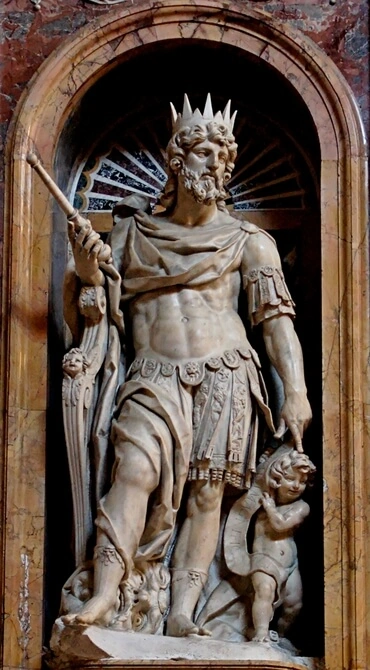1
Y aconteció después de la muerte de Saúl, que vuelto David de la derrota de los amalecitas, estuvo dos días en Siclag;
2
y al tercer día aconteció, que vino uno del campamento de Saúl, rotos sus vestidos, y tierra sobre su cabeza; y llegando a David, se postró en tierra, y adoró.
3
Y le preguntó David: ¿De dónde vienes? Y él respondió: Heme escapado del campamento de Israel.
4
Y David le dijo: ¿Qué ha acontecido? Te ruego que me lo digas. Y él respondió: El pueblo huyó de la batalla, y también muchos del pueblo cayeron y son muertos; también Saúl y Jonatán su hijo murieron.
5
Y dijo David a aquel joven que le daba las nuevas: ¿Cómo sabes que Saúl es muerto, y Jonatán su hijo?
6
Y el joven que le daba las nuevas respondió: Casualmente vine al monte de Gilboa, y hallé a Saúl que estaba recostado sobre su lanza, y venían tras él carros y gente de a caballo.
7
Y cuando él miró atrás, me vio y me llamó; y yo dije: Heme aquí.
8
Y él me dijo: ¿Quién eres tú? Y yo le respondí: Soy amalecita.
9
Y él me volvió a decir: Yo te ruego que te pongas sobre mí, y me mates, porque me toman angustias, y aún toda mi alma está en mí.
10
Yo entonces me puse sobre él, y lo maté, porque sabía que no podía vivir después de su caída; y tomé la diadema que tenía en su cabeza, y la ajorca que traía en su brazo, y las he traído acá a mi señor.
11
Entonces David trabando de sus vestidos, los rompió; y lo mismo hicieron los hombres que estaban con él.
12
Y lloraron y lamentaron, y ayunaron hasta la tarde, por Saúl y por Jonatán su hijo, y por el pueblo del SEÑOR, y por la casa de Israel; porque habían caído a cuchillo.
13
Y David dijo a aquel joven que le había traído las nuevas: ¿De dónde eres tú? Y él respondió: Yo soy hijo de un extranjero, amalecita.
14
Y le dijo David: ¿Cómo no tuviste temor de extender tu mano para matar al ungido del SEÑOR?
15
Entonces llamó David a uno de los jóvenes, y le dijo: Llega, y mátalo. Y él lo hirió, y murió.
16
Y David le dijo: Tu sangre sea sobre tu cabeza, pues que tu boca atestiguó contra ti, diciendo: Yo maté al ungido del SEÑOR.
17
Y endechó David a Saúl y a Jonatán su hijo con esta endecha.
18
(Dijo también que enseñasen el arco a los hijos de Judá. He aquí así está escrito en el libro del derecho):
19
¡La gloria de Israel, muertos sobre tus collados! ¡Cómo han caído los valientes!
20
No lo denunciéis en Gat, no deis las nuevas en las plazas de Ascalón; para que no se alegren las hijas de los filisteos, para que no salten de gozo las hijas de los incircuncisos.
21
Montes de Gilboa, ni rocío ni lluvia caiga sobre vosotros, ni seáis tierras de ofrendas; porque allí fue desechado el escudo de los valientes, el escudo de Saúl, como si no hubiera sido ungido con aceite.
22
Sin sangre de muertos, sin grosura de valientes, la saeta de Jonatán nunca volvió atrás, ni la espada de Saúl se tornó vacía.
23
Saúl y Jonatán, amados y queridos en su vida, en su muerte tampoco fueron apartados. Más ligeros que águilas, más fuertes que leones.
24
Hijas de Israel, llorad sobre Saúl, que os vestía de escarlata en sus fiestas, que adornaba vuestras ropas con ornamentos de oro.
25
¡Cómo han caído los valientes en medio de la batalla! ¡Jonatán, muerto en tus alturas!
26
Angustia tengo por ti, hermano mío Jonatán, que me fuiste muy dulce; más maravilloso me fue tu amor, que el amor de las mujeres.
27
¡Cómo han caído los valientes, y perecieron las armas de guerra!







